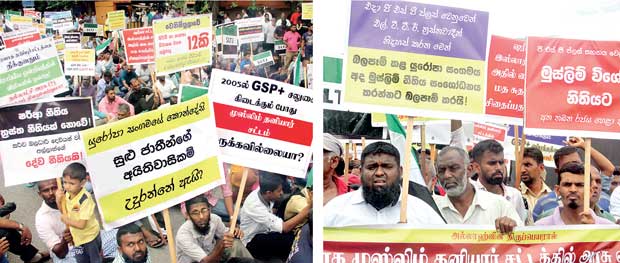Reply To:
Name - Reply Comment
Last Updated : 2024-04-26 18:26:00

 The aboriginal or indigenous Sri Lankans, known as the Veddahs, appear to be happy as they are. They seem to enjoy some ancient rituals and customs to this day, and apparently have no issue with their lifestyle. Although they do see how other Sri Lankans live in this country, they prefer their inherited style of living. They probably resist external intrusions.
The aboriginal or indigenous Sri Lankans, known as the Veddahs, appear to be happy as they are. They seem to enjoy some ancient rituals and customs to this day, and apparently have no issue with their lifestyle. Although they do see how other Sri Lankans live in this country, they prefer their inherited style of living. They probably resist external intrusions.
International laws and international humanitarian laws protect the rights of these indigenous people to live the Veddah life, so long as they wish to. Even the last person amongst the Veddahs will be entitled to that right. These laws protect their lifestyle from outside intrusions, even those based on grounds such as modern international standards. If not for international treaties, declarations and covenants, the enforcement of modern norms could extinguish the Veddah community over the years. It would render the protection given to their way of life under international law meaningless. Any one amongst the Veddahs is equally free to abdicate the ‘majestically simple’ lifestyle and join the ‘rat race’ of the advanced human species. It is also their exclusive right to voluntarily cease their way of life.

The universal human rights instruments which protect them include the Declaration on the Rights of Indigenous Peoples, the Indigenous and Tribal Peoples Convention as well as the Declaration on the Rights of Persons belonging to National or Ethnic, Religious and Linguistic Minorities. These are human rights as fundamental as the Universal Declaration of Human Rights (UDHR) or the International Covenant on Civil and Political Rights (ICCPR).
A reading of these human rights instruments will convince anyone that the objective of these instruments is primarily the protection of the rights of indigenous people to live in their chosen way.
However, the Declaration on the Rights of Indigenous People affirms that; ‘indigenous people are equal to all other people, while recognising the rights of all people to be different, to consider themselves different, and to be respected as such.’ The declaration also recognises respect for indigenous knowledge, cultures and traditional practices. The UN adopted this declaration in 2007 by a majority of 143 states in favour and 4 states against (Australia, Canada, New Zealand and the United States).
It is respect and protection of these human rights that contribute to reconciliation, integration amidst diversity and peaceful co-existence. International conventions and treaties of the United Nations presently enjoy equivalent status in international law. Provisions in one treaty for instance cannot override the provisions in another treaty. One treaty cannot be used as a ‘sword’ against another. If it were not the case, the human rights of the Veddahs protected under the treaties could get compromised by provisions in other treaties.
The several provisions in a single treaty have also equivalent status. For instance, article 25 (2) of the UDHR states; “Motherhood and childhood are entitled to special care and assistance.” One cannot argue that the mother’s right to ‘special care and assistance’ violates the husband’s right to ‘equality of rights’ during marriage provided for in article 16 (1) of the UDHR. Notwithstanding the equivalent status of the several provisions in treaties, the more general equality provision in 16 (1) will give way to the more specific right in 25 (2). It could also be argued that the additional special right given to the mother, she being in a legally-recognisable ‘disadvantaged’ situation unlike the father, provides for a more equitable equality. In fact, the father is in a lesser disadvantageous position than the mother. The right to ‘special care and attention’ fills the gap. The mother’s position thereby is compensated, and not compromised.
Article 8.3 of the Declaration on the Rights of Persons Belonging to National or Ethnic, Religious and Linguistic Minorities states; “Measures taken by States to ensure the effective enjoyment of rights set forth in the present declaration shall not prima facie be considered contrary to the principles of equality contained in the Universal Declaration of Human Rights.”
The point I place here is that any reference to ‘equal’ rights cannot be limited to the dictionary meaning of the word, equal. A volume of consistent legal interpretations of terminologies in local legislation by courts around the globe exist. The interpretations are based on sound legally-recognised principles providing a more equitable interpretation to words such as equal.
The personal laws including marriage-related laws of the several communities in countries which have signed and acceded to the UN treaties have similar protection. The principle object of these treaties is to safeguard human rights of these communities to live according to their customs, religions and culture, and to protect them from interferences, particularly from the state.
Article 27 of the ICCPR, for instance, prevents the state from denying the right of minorities; “….in community with other members of their group, to enjoy their own culture, to profess and practice their own religion or to use their own language.” The preamble to the Declaration on the Rights of Persons Belonging to National or Ethnic, Religious and Linguistic Minorities states among other things that the said declaration is inspired by the aforesaid provisions of article 27 of the ICCPR. Article 1 of the said declaration mentions; “States shall protect the existence and the national or ethnic, cultural, religious and linguistic identities of minorities within their respective territories and shall encourage conditions for the promotion of that identity.”
This does not mean that communities or individuals within communities are left without recourse to changes in their system or order. The treaties appear to encourage changes emanating from the communities as per their determination, which may also be described as self-determination. A more detailed analysis on this aspect can be set out in a separate article considering space constraints.
There is no debate within the community that several provisions in the Muslim Marriage and Divorce Act (MMDA) require amendments. In fact, the MMD Act no. 13 of 1951 had been subject to amendments, mostly incidental, in 1954, 1955, twice in 1965, 1969, 1975 and 2006. There were at least four nationally-recognised committees from 1972 to 2009, which had addressed the need for amendments. There are deficiencies in the Act, which had been noted by the earlier committees. The 2009 committee, headed by former Supreme Court Judge and respected scholar Justice Saleem Marsoof, had finalised most of its work. This committee must be allowed to complete its work at the earliest, but without also rushing, as some issues are sensitive.
The concerns of women and the interests of children must be taken into due consideration without the need for any debate between the Islamic style of life and other ways of life.
(mm_zuhair@yahoo.com - The views expressed do not reflect the views of any official position previously or presently held by the writer).

Add comment
Comments will be edited (grammar, spelling and slang) and authorized at the discretion of Daily Mirror online. The website also has the right not to publish selected comments.
Reply To:
Name - Reply Comment
US authorities are currently reviewing the manifest of every cargo aboard MV
On March 26, a couple arriving from Thailand was arrested with 88 live animal
According to villagers from Naula-Moragolla out of 105 families 80 can afford
Is the situation in Sri Lanka so grim that locals harbour hope that they coul

59 minute ago
3 hours ago